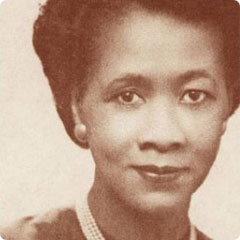| |
||
 Civil-rights leader and women's activist Dorothy Height. Schomburg Center for Research in Black Culture, The New York Public Library, Astor, Lenox, and Tilden Foundations |
The civil-rights leader Dorothy Height describes changes in Harlem that she saw over time, and her attachment to the neighborhood. Dorothy Height first moved to Harlem to live with her sister while she attended New York University in 1929. Active in the Christian Youth Movement, she represented Harlem as one of ten American young people who worked with Eleanor Roosevelt in planning the World Youth Congress held in 1938. In 1939, she went to Washington, where she met Mary McLeod Bethune, the president and founder of the National Council of Negro Women, who invited her to become its executive secretary. Height became the elected president of the NCNW in 1957, and in the early sixties joined the Council for United Civil Rights Leadership, a group key to the organization of the March on Washington and other critical steps in the civil-rights movement. |